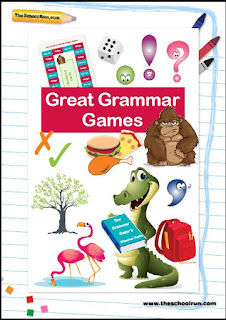Great Grammar Games.
 |
| Great Grammar Games. |
Grammar in primary school:
what you need to know to support your child Grammar.
The word sends shivers down the spines of parents, children and even a few teachers! But why does it? Maybe it’s the fact that this element of the English language comes with its
own glossary of terms.
own glossary of terms.
Trying to sort your main clauses from your subordinate clauses and your nouns from your verbs can become something of a nightmare, especially for children.
The aim of this learning pack is to make the many aspects of primary grammar straightforward and, most importantly, fun.
The aim of this learning pack is to make the many aspects of primary grammar straightforward and, most importantly, fun.
Since May 2013, Year 6 children have taken a ‘SPAG’ (spelling, punctuation and grammar) test as part of their KS2 SATs and this can be quite a daunting prospect.
Grammar is an important aspect of the assessment, and more complex grammar concepts have been introduced as part of the new national curriculum (from 2014).
We hope that, by using this comprehensive pack, your child will feel confident about tackling the test, and that they will deepen their understanding of the English language.
We hope that, by using this comprehensive pack, your child will feel confident about tackling the test, and that they will deepen their understanding of the English language.
Grammatical terms and word classes
There is an extensive list of words associated with grammar that
children need to know, understand and use.
Until now, in many primary schools, the teaching of grammar has been implicit –
children learned the appropriate skills without really knowing that they were learning them. There are advantages and disadvantages; while the whole prospect doesn’t seem so daunting, it is difficult to progress to learning a foreign language without a secure understanding of the vocabulary associated with English grammar.
Additionally, if children write an inaccurate sentence, they are unlikely to be able to unpick it and correct it without a sufficient understanding of grammar.
The grammar glossary on the following pages includes many of the words associated with grammar and provides specific examples.
children learned the appropriate skills without really knowing that they were learning them. There are advantages and disadvantages; while the whole prospect doesn’t seem so daunting, it is difficult to progress to learning a foreign language without a secure understanding of the vocabulary associated with English grammar.
Additionally, if children write an inaccurate sentence, they are unlikely to be able to unpick it and correct it without a sufficient understanding of grammar.
The grammar glossary on the following pages includes many of the words associated with grammar and provides specific examples.
It also covers aspects of sentences, which can become very complicated.